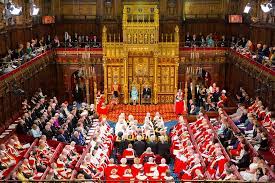15 September 2022
Constitutional Monarchy
A force for good.
By Lynda Goetz

The outpouring of emotion, not just in the United Kingdom but around the world, on the death of Queen Elizabeth has taken many by surprise – including those who did not really expect to find themselves tearful at the demise of a figurehead they did not know personally. Perhaps we should not be surprised, either at our own reactions or at the response of foreigners whose own relationship with our monarchy might appear even more tenuous.
Those questioned by journalists outside palaces and churches or at the roadside made comments about the Queen’s humanity, her graciousness, the example she set, or the fact that she felt like ‘everyone’s Granny’. It was all those things and more. Queen Elizabeth captured the imagination of many around the world when she acceded to the throne at the tender age of 25. As one young woman commented outside Buckingham Palace the other night, “I am the age she was then. I could not imagine taking on that responsibility at my age”. It is almost certainly true that our current generations of youth have, at least in this country, been able to delay adulthood in a way which would have been inconceivable even 70 years ago (but that is a subject for another time); however, add to that the fact that, although when she was born there was no expectation that Elizabeth would ever be Queen, once her father became King she was prepared for the role of future Queen very carefully. Even so, the premature death of George VI in 1952 at the age of 57 catapulted the Queen and Prince Philip into a life which they had both been hoping and expecting was not to be theirs for at least another decade or more.
The Queen once famously said that ‘The Crown is an idea, not a person’. As others have since commented, however, the person who represents that idea is important. Their personality and behaviour can make or break the acceptance of the concept. The Queen dedicated her life to her duty and to her people. As Head of State, she knew she had a role to play, and the general consensus is that she played that role to perfection. Of course, there are those who are opposed to the idea of hereditary monarchy and who argue for a republic. Some have even dared to voice this in the face of the current public mourning. They have a right to that opinion and police who have mistakenly stepped in suggesting they are guilty of a ‘breach of the peace’ have been rightly corrected by their superiors.
The alternative to the constitutional monarchy which we enjoy in this country is generally, in a democracy, a situation where the Head of State and the Head of Government are united in one person, often with the title of President. Combining these two roles has distinct disadvantages. Our hereditary Head of State, now King Charles III, has no political role. He is not also Head of Government. That job falls to an elected politician who is Prime Minister; since last week, when she was sworn in by the Queen as one of her very last duties, it is head of the Tory party, Liz Truss. The former United States National Security Advisor, John Bolton, writing in The Telegraph last week opined that ‘whilst a President can certainly be a unifying figure, he is always at risk of accusations that he is putting party priorities above those of the nation as a whole’. In a country with a hereditary constitutional monarchy there can never be such accusations.
There can also never be the grubby political ambition, greasy-pole climbing or financial influence which is inherent in a system where the head of state is elected, however those elections are carried out – whether it is a system like that of the US or the French system. Clearly constitutional monarchy is not perfect; no system devised by human beings and dependant on them ever could be (that’s not to say that we would ever want to rely on the rationality and logic of machines!), but insofar as those who are born to it and those who marry into it feel the weight of responsibility to carry it on as a duty and a service to the people of the nation, knowing that if they overstep the mark, then the system (and with it their rights and privileges) will be swept aside, then it achieves a balance difficult to achieve within a system where power resides in the hands of the political victors.
This last week has shown the esteem in which our Queen is held across the globe. Commonwealth nations have paid tribute to a Queen who, although from a country many resented for our historical transactions and behaviours, has managed through her diplomacy and personality to unite in a unique partnership. France, our EU neighbour which has been so difficult and petulant over our leaving the EU partnership, has paid deference to a Queen whom Emmanuel Macron said they call simply ‘The Queen’.
At the same time as all the sadness and tears, there has also been a wonderful show of unity and support for our new King. King Charles III, who at one time appeared deeply unpopular and unlike his mother has had to wait a lifetime to inherit the crown, has stepped into his new role with incredible diplomacy as well as dignity and graciousness. For most of us who have lived our entire lives in the reign of Queen Elizabeth II, it does not come easily to refer to a King, but the smoothly oiled machinery of the Palace has geared up to ensure an impressively seamless transition complete with the pageantry for which this country is justifiably famous. Although at times the incongruity of men-at-arms in velvet and brocade or ancient gleaming armour bearing halberdiers or longbows juxtaposed with street signs and traffic lights seems slightly bizarre and eccentric, it is in part these paradoxes which make this country what it is. It is the ancient and time-honoured traditions alongside the understanding of the need for change and progress which have kept the monarchy going in this country for far longer than in many other democracies. Long may it continue.


